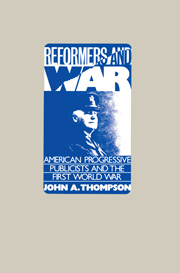6 - The wartime experience
Published online by Cambridge University Press: 24 November 2009
Summary
The atmosphere of war
American entry into the war had a profound and cumulative effect on the mood of the country and the temper of public debate. As the nation, with widespread reluctance, faced the as yet unfamiliar prospect of sending hundreds of thousands of its young men to risk their lives on foreign battlefields, the strain showed. The divisions revealed during the years of neutrality were exacerbated, and tolerance was at a premium. Progressive publicists were affected by this change of atmosphere, both as participants and as victims. Even during the preceding debate, the emotional gulf dividing advocates and opponents of intervention had generally been greater than the intellectual distance between them, and this became even more the case after the declaration of war on April 6, 1917.
In part, this was because the scope of disagreement narrowed as the issue receded into history. Once the decision had been made, most of those who had opposed intervention abandoned, or at least suspended, overt criticism of it. The spirit in which they did so varied. Kellogg seems to have been moved by a mixture of patriotism and prudence. “I am not for blocking the prosecution of the war, now that the decision has gone against me,” he wrote to the secretary of the American Union against Militarism, the more unyielding Crystal Eastman. His most immediate concern, as he explained to Jane Addams when returning to her an article on “Patriotism and Pacifists,” was “to conserve the Survey,” at a time when “the cleavages are so real.”
- Type
- Chapter
- Information
- Reformers and WarAmerican Progressive Publicists and the First World War, pp. 177 - 233Publisher: Cambridge University PressPrint publication year: 1987



